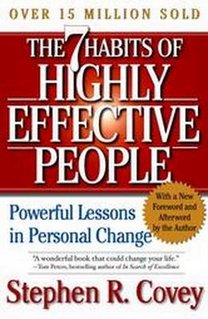
Recently I have begun reading the book The 7 Habits of Highly Effective People by Stephen Covey. I have realized that one area I want to grow in is Leadership, and so I have been recommended 4 books, all of which I have to goal to read by Christmas. The 7 Habits of Highly Effective People is the first book on that list.
In this book, the author tells the reader to read the book as if you are going to be teaching the content of the book shortly after. In this way, you will take more from the book than if you were just reading it for leisure. So I intend to report on each of the 7 habits, for you, my class J. Of course, what follows is just a short “Coles notes” of the chapter. You will be missing the helpful analogies, stories, etc. But hopefully you will get the basic gist of it. Maybe it will whet your appetite to read the book yourself. So far I recommend it!
Habit 1 – Be Proactive
We as humans are not our feelings. One thing that separates us from the animal kingdom is that we can “step outside” ourselves, and look at our paradigm (how we see things).
There is a theory that says that our lives are determined by three things: Genetic determinism (Our DNA), Psychic determinism (The way our parents formed us growing up), and Environmental determinism (the people or situations around us). When we are confronted by a stimulus, we will respond in a certain way because of the three determiners. For example, when someone cuts us off on the highway, we will react in this certain way; or when we receive a gift, we will react that way. This is called the stimulus/response theory. Is this theory correct?
A guy named Victor Frankl discovered during the holocaust (he was a Jew in the Prison camps) that even among the most horrific circumstances, that he had a choice whether what was happening around him would determine his mood. He discovered a fundamental principle about man, that in between stimulus and response, man has the freedom to choose. It is not what others do to us or even our own mistakes that hurt us the most; it is our response to those things.
Proactivity defined is that we as human beings are responsible for our own lives. Our behavior is a function of our decisions, not our conditions. We can take what happens around us, good or bad, and not let our feelings or emotions determine our decisions. We have the initiative to make things happen. Look at the word responsibility – response ability – the ability to choose your response. Highly effective people do not blame their circumstances or conditions. Their behavior is a result of their own conscious choice.
Many people wait for things to fall into their laps. In this way, they act reactively. This limits them to their surroundings or conditions. People who have made a great difference in the world, conversely, act proactively regardless of their circumstances.
Anytime we think that the problem is “out there”, that thought is the problem. By blaming things that are “out there” we allow what is “out there” to control us. The proactive approach is to change from the inside-out: to be different, to be more resourceful, to be more diligent. We need to look at what we can control rather than what we cannot. If I really want to change the situation, I need to work on the one thing I have control over – myself.
1 comment:
Interesting. We learned a lot of similar stuff the first two yrs in my Mass Comm. program.
Trying to understand how the media affects us, if at all.
First it was thought that it directly affects us - stimulus response theory.
However later, much like in the chapter in this book, it was learned that it is much more complicated than that. People have "groups" they are a part of, and they get their opinions based on those around them, rather than being directly influenced by the media.
While there are many other theories, unique from those two and variations of them, it ultimately comes back to the individual to decide how they will be affected by the media and communications in general. It is up to the individual if they will allow the dominant ideology to affect and influence them, or to oppose it and find their own meaning - or find a balance between the two.
Just interesting to see the parallel that these theories carry across the board - its not just regulated to one area of study or one period in time.
Post a Comment